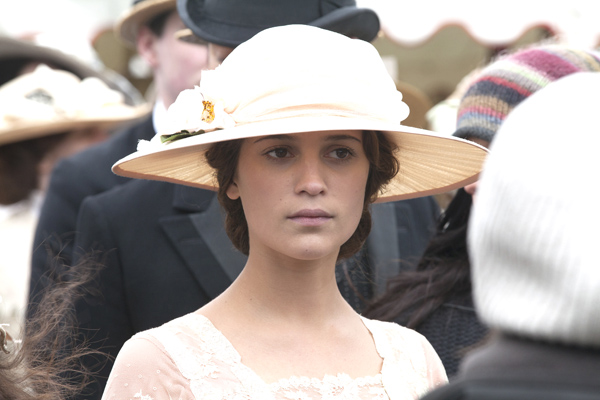![]() World War One destroyed Europe’s working-class and noble young people alike. It slaughtered youth, beautiful and idealistic; youth, in love with love, besotted by its own energy and potential; youth, drawn in, desensitized, and finally ground into pieces. Based on the memoir by Vera Brittain, Testament of Youth tells the story of the war in a way that is old-fashioned but powerful, grounded in historical and emotional reality. A massive clash’s crushing force comes to life almost as a character of its own.
World War One destroyed Europe’s working-class and noble young people alike. It slaughtered youth, beautiful and idealistic; youth, in love with love, besotted by its own energy and potential; youth, drawn in, desensitized, and finally ground into pieces. Based on the memoir by Vera Brittain, Testament of Youth tells the story of the war in a way that is old-fashioned but powerful, grounded in historical and emotional reality. A massive clash’s crushing force comes to life almost as a character of its own.
The film is unusual from the start because it recalls the era through the eyes of a real-life woman, celebrated writer Brittain. In 1914, the well-born intellectual rebels against her parents’ wishes for her to marry, and she leaves for Oxford University. The war’s outbreak takes her to the French front as an army nurse. Along the way she witnesses horrific scenes, loses a fiancé, a brother, and close friends. (After the armistice, Brittain embarked on a career as a pacifist and best-selling author.)
It is hard to think of a better choice to play this obstinate, brave, and emotional character than Sweden’s Alicia Vikander (A Royal Affair). Currently generating buzz in Ex Machina, Vikander is a wonderful discovery who brings competing energy and intelligence to a substantial role. Her expressive, almost harshly beautiful face glows with defiance, longing, and bitter humor. She grows gaunt and hard as the burdens of war add up, and moves through the era’s parlors and donnish enclaves seeming perfectly at home. It also doesn’t hurt that she cuts a winsome figure in the fashions of 1914, which fail to smother her restless energy and forward motion.
Director James Kent unpacks Brittain’s story episodically, beginning with family gatherings and taking his heroine to Oxford, to the front, and back again. At first, Vera and her friends think the war is a lark, bound to end soon in certain victory. How wrong they are becomes apparent with a sense of icy dread as battles grow more vicious and unending.
The movie makes the point that the war haunts everyone and spares no one. Vera sneaks time for a romance with the cool, handsome Roland (Kit Harington), a fellow scholar who encourages her academic interests. Their love is doomed, but so is everyone else’s. For countless families, the arrival of the mail brings terrible news. Crowd scenes at train stations convey mass mobilization. And at the German front, a crane shot of wounded men reveals the scope and cruelty of the battle. While the characters’ elevated pedigrees may make the movie feel Masterpiece-ish, bloody and agonizing scenes bring war’s pain fully home.
Subtle touches place Testament of Youth a cut above the common historical drama. Camerawork by Rob Hardy interestingly combines 1980s gauziness with dynamic movement. Supporting turns by Miranda Richardson, Emily Watson, and the rest of the cast are spot-on. Characters say less than they know or feel, making underlying meaning stronger, and moments of humble kindness stand out amid mayhem. War can bring forward grace and compassion, a near-cliché that the film redeems with a light touch.
Scarred by battle, hollowed by loss, Vera Brittain is more determined than ever to live at the movie’s end. It’s a desire that is staunch and old-school, but makes sense in light of her strength. On a larger scale, her will to live strikes a quiet blow against wars that grab hold of beautiful youth and devour it.







Leave A Comment